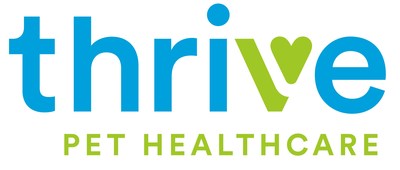Parasite Hot Zones: States Where Pets Are Most at Risk
Thrive Pet Healthcare urges year-round prevention as fleas, ticks and mosquitoes become harder to avoid
AUSTIN, Texas, April 2, 2025 /PRNewswire/ -- From fleas and ticks to mosquitoes, parasites are active in every state—and not just during the warmer months. Thrive Pet Healthcare is issuing a nationwide reminder that year-round prevention is the best way to keep pets and families safe from parasites, especially in states with rising infection rates.
Parasites don't follow a calendar. Veterinarians see pets with parasite-related illnesses year-round, even indoor pets."Parasites don't follow a calendar," said Dr. Kelly Cairns, Vice President of Medical Excellence and Education at Thrive Pet Healthcare. "We see dogs and cats dealing with parasite-related illnesses throughout the year, even if they don't go outside much. Sometimes, it just takes one little mosquito slipping in through an open door or a flea hitching a ride on someone's pant leg for your furry friend to end up with more than just an itch."
Where Parasites Are on the Rise—and Pets Are Paying the Price
According to 2024 data from the Companion Animal Parasite Council, some U.S. states had higher-than-average rates of parasite-borne illnesses in dogs and cats:
- Heartworm disease (dogs): Carried by mosquitoes, heartworm can affect a dog's heart and lungs. Some dogs exhibit signs such as coughing, shortness of breath, fatigue after moderate activity, or weight loss, while others may not show symptoms until the disease is more advanced. Fortunately, it's very preventable with veterinarian-prescribed preventatives.
- Mississippi has the highest infection rate, with 1 in 15 dogs testing positive.
- Louisiana, Alabama and Arkansas follow closely at 1 in 30.
- Heartworm-positive cases have also increased in Texas, South Carolina and Georgia.
- Heartworm disease (cats): Cats can also get heartworm, even if they never go outside. A single mosquito bite is all it takes. Symptoms may include coughing, vomiting or difficulty breathing, but some cats show no signs at all.
- Approximately 1 in 500 cats nationwide test positive for heartworms each year.
- Heartworm rates are higher in Texas, Mississippi, Alabama and Louisiana, where 1 in 200 cats tested positive.
- Lyme disease: Lyme disease is the most common tick-borne illness in dogs. It may cause joint stiffness, lethargy, and loss of appetite. If caught early, it's manageable with treatment.
- West Virginia had the highest infection rate, with 1 in 6 dogs testing positive.
- Vermont, Maine and Connecticut are also high-risk states, with 1 in 8 dogs testing positive.
- Pennsylvania, Massachusetts and New Hampshire follow closely, with 1 in 10 dogs testing positive.
- Anaplasmosis: Spread by ticks, anaplasmosis can affect dogs, cats and humans. In pets, it can cause fever, lethargy, joint pain, and loss of appetite, while in humans, symptoms resemble those of the flu. It's typically treated with antibiotics.
- The highest rates were found in Maine and Vermont, with 1 in 3 dogs testing positive
- Connecticut, New Hampshire and Massachusetts followed at 1 in 4 dogs testing positive.
- Ehrlichiosis: Another tick-borne illness, ehrlichiosis may cause symptoms in pets such as low energy, joint pain or changes in appetite. In most cases, it can be treated, especially when caught early.
- Arkansas had the highest number of cases, with 1 in 6 dogs testing positive
- Missouri (1 in 10) and Oklahoma (1 in 11) followed.
Fleas, Ticks and Mosquitoes Don't Take a Season Off
While many people believe parasite problems disappear in winter, that's not the case. Parasites are resilient and can stick around in warm homes or mild outdoor climates.
"A tick can survive for more than 200 days without food or water, and fleas can continue to multiply even in your living room," said Dr. Cairns. "That's why year-round prevention makes a big difference."
Approximately 1 in 7 dogs and 1 in 4 cats are affected by fleas, which can lead to itchy skin, tapeworm infections, or other health issues.
Protecting Pets and Families
Veterinarian-prescribed preventatives are the most effective way to protect pets from parasites and their associated diseases. Until June 30, 2025, participating Thrive Pet Healthcare hospitals are offering 15% off in-hospital purchases of popular parasite preventatives, including:
- ProHeart® 12: One dose provides 12 months of heartworm prevention for dogs
- Simparica®: A 6-pack of chewables for monthly flea and tick protection
- Simparica Trio®: A monthly chewable that protects against fleas, ticks and heartworm
- Revolution Plus®: A 6-pack of monthly applications for cats
With a Thrive Plus membership, year-round protection is more accessible and affordable for pet parents. Member pets receive unlimited free exams,* $5 basic nail trims, and 10% off services like bloodwork, dental cleanings and spay/neuter—making it easier to stay on top of health concerns before they become serious.
Visit thrivepetcare.com to find a location near you that offers primary, specialty, emergency, and urgent veterinary care services, as well as participating Thrive Plus membership hospitals.
* Clinic fees may apply. Twelve-month commitment required. Terms apply.
About Thrive Pet Healthcare:
Thrive Pet Healthcare is a leading veterinary service community that uniquely delivers a continuum of care to pet families and services to veterinary hospitals. With an industry-first membership program and over 360 acute, primary, and specialty providers, Thrive Pet Healthcare offers personalized, accessible care through every stage of a pet's life and health. The veterinarian-founded organization provides premier benefits for practice staff while elevating privately held veterinary hospitals with innovative service and technology solutions. By focusing on the needs and aspirations of veterinary care providers, Thrive Pet Healthcare is supporting the well-being of the industry and raising the national bar for veterinary excellence. To learn more about Thrive Pet Healthcare, please visit www.thrivepetcare.com.
![]() View original content to download multimedia:https://www.prnewswire.com/news-releases/parasite-hot-zones-states-where-pets-are-most-at-risk-302418633.html
View original content to download multimedia:https://www.prnewswire.com/news-releases/parasite-hot-zones-states-where-pets-are-most-at-risk-302418633.html
SOURCE Thrive Pet Healthcare

